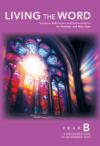Scripture Study for
Second Sunday of Easter
Acts 5:12–16 / Psalm 118:1 / Revelation 1:9–11a, 12–13, 17–19 / John 20:19–31
<< Back to LECTIONARY RESOURCES
Understanding the Word
By Br. John R. Barker, OFM
The apostles of Jesus have been sent by him to continue his mission of proclaiming God’s reign, God’s exercise of sovereign power to heal all deformations of the divine will for the flourishing of all creation. In addition to the forgiveness of sins, the apostles proclaim God’s reign by acting as instruments of physical healing and deliverance from demons. At the Jerusalem temple many have gathered to see the apostles. Although they are hesitant to “join them,” that is, to become disciples of Jesus and be baptized, they nevertheless “esteem” the apostles (in contrast to many of the religious leaders). The power of the apostles to heal is matched by the powerful faith of the people, who trust that even Peter’s shadow will bring healing!
The larger context of the book of Revelation is the persecution of Christians by the Roman Empire. The book begins with an introduction by the author, John, who is on the Roman penal colony of Patmos because of his witness to Christ. He recounts here how he was called to give prophetic witness and encouragement to other Christians from his imprisonment. The scene of seven lampstands calls to mind the interior of the Jerusalem temple (1 Kings 7:49); we are thus in the divine realm. The “one like a son of man” (see Daniel 7:13) is the glorified Christ dressed in royal garb. Christ, who encompasses all of reality (first and last), is master over death. The message for faithful persecuted Christians is clear: Christ reigns and they have nothing to fear.
The fearful disciples have hidden from the world. Into their fear comes Christ, who twice proclaims peace and sends them back out into the world. Their mission is not only to forgive (or retain) sins, but to proclaim Jesus as God’s Messiah, proof of which claim is his resurrection. While the disciples have the advantage of actually seeing the resurrected Christ, those to whom they are sent will not. The story of Thomas emphasizes the necessity for those who are not able to “see the mark of the nails in his hands” to believe on the strength of the witness of others that Jesus of Nazareth, crucified as a criminal, is in fact “Lord and God.”
